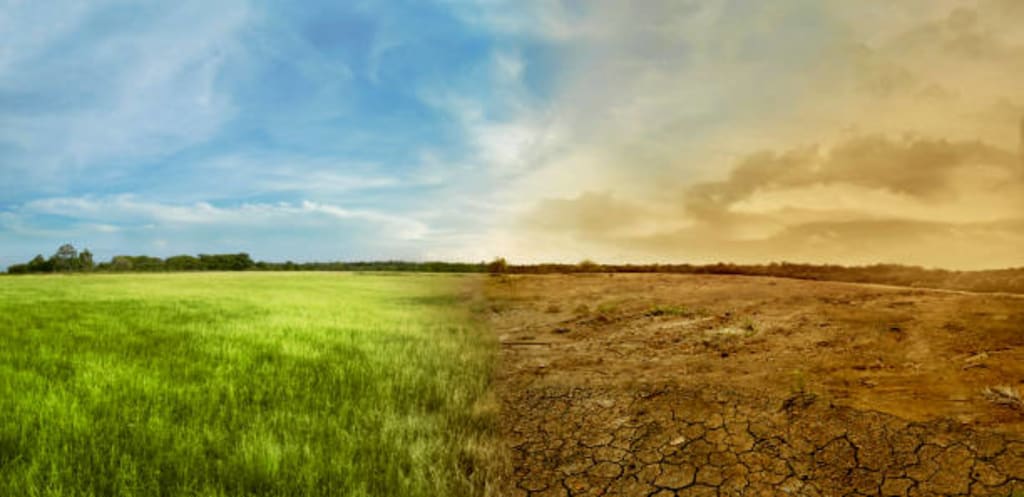The impact of climate change on food production.
a looming crisis

Introduction
Climate change is undeniably one of the greatest challenges of our time, affecting various aspects of our lives, including the global food system. As the Earth's climate continues to undergo significant changes, the world's ability to produce enough food to sustain a growing population is at risk. This article explores the profound impact of climate change on food production and highlights the urgent need for proactive measures to address this looming crisis.
Changing Weather Patterns and Crop Yields
Climate change is altering weather patterns across the globe, leading to extreme and unpredictable weather events. Rising temperatures, erratic rainfall, prolonged droughts, and more frequent and severe storms are becoming the new norm. These changes directly affect crop yields and agricultural productivity.
Crop yields heavily rely on stable weather conditions, including temperature, precipitation, and sunlight. However, rising temperatures disrupt the delicate balance required for crop growth. Excessive heat stress negatively affects photosynthesis, reduces crop pollination, and increases the evaporation of soil moisture. As a result, crop yields decline, compromising food production.
Erratic rainfall patterns pose another significant challenge. Droughts and prolonged dry spells impact water availability, leading to water stress for crops. Insufficient water reduces plant growth, affects nutrient absorption, and increases the vulnerability of crops to pests and diseases. Conversely, intense rainfall and flooding events can lead to soil erosion, nutrient leaching, and crop damage, further hampering food production.
Shifting Agricultural Zones and Crop Adaptation
The changing climate is also causing shifts in agricultural zones, with traditional growing areas becoming unsuitable for certain crops. Rising temperatures enable pests and diseases to thrive in regions where they were once scarce, putting crops at greater risk. At the same time, shifting climatic conditions create challenges for farmers to determine the best timing for planting, harvesting, and managing pests and diseases.
Crop adaptation becomes crucial in the face of changing climatic conditions. Farmers must seek out crop varieties that are more resilient to heat, drought, and diseases. Developing and promoting climate-smart agricultural practices, such as precision farming, conservation agriculture, and agroforestry, can enhance resilience and productivity. Additionally, investing in research and development to breed climate-resilient crop varieties is vital to mitigate the negative effects of climate change on food production.
Threats to Livestock and Aquaculture
Climate change poses significant threats to livestock and aquaculture production systems. Rising temperatures increase heat stress on animals, leading to reduced feed intake, weight loss, and decreased reproductive efficiency. Moreover, changing precipitation patterns affect the availability and quality of grazing land, further impacting livestock productivity.
Aquaculture, which plays a critical role in global food security, is also affected by climate change. Rising sea temperatures, ocean acidification, and extreme weather events pose significant challenges to fish and shellfish farms. These changes disrupt the delicate marine ecosystem, affecting the availability of fish stocks and compromising the livelihoods of coastal communities reliant on fisheries.
Food Security and Vulnerable Communities
The impact of climate change on food production exacerbates food insecurity, particularly in vulnerable communities. Developing countries with limited resources and infrastructure are most at risk. Small-scale farmers, who account for a significant portion of global food production, face the greatest challenges in adapting to climate change due to limited access to technology, finance, and information.
Inadequate access to nutritious food can lead to malnutrition and its associated health problems, further exacerbating the vulnerability of communities. The combination of decreased agricultural productivity, increased food prices, and limited resources to adapt can result in increased poverty, social unrest, and mass migration.
Mitigating Climate Change and Ensuring Food Resilience
Addressing the impact of climate change on food production requires a multi-faceted approach involving governments, international organizations, businesses, and individuals. Several key strategies can help mitigate the adverse effects and build resilience within the food system:
Mitigation: Reducing greenhouse gas emissions is critical to slowing down climate change. Transitioning to renewable energy sources, promoting sustainable land management practices, and adopting climate-friendly technologies can significantly contribute to mitigating climate change.
Adaptation: Investing in research and development to develop climate-resilient crop varieties, improving irrigation systems, and promoting sustainable water management practices can help farmers adapt to changing climatic conditions.
Sustainable agriculture: Encouraging sustainable farming practices, such as agroecology, organic farming, and integrated pest management, can enhance soil health, conserve water, and reduce the reliance on synthetic inputs, thereby promoting food resilience.
Strengthening infrastructure: Enhancing rural infrastructure, such as irrigation systems, storage facilities, and transportation networks, can improve farmers' access to markets, reduce post-harvest losses, and increase food availability.
Empowering small-scale farmers: Providing access to finance, technology, and training for small-scale farmers can help build their capacity to adapt to climate change, improve productivity, and enhance food security in vulnerable communities.
Conclusion
The impact of climate change on food production is already evident, and its consequences will continue to worsen if immediate action is not taken. The urgent need to address climate change and its effects on the global food system cannot be overstated. By adopting sustainable agricultural practices, investing in research and development, and empowering small-scale farmers, we can mitigate the impact of climate change and ensure a resilient and sustainable food future for generations to come. Only through collective efforts can we overcome this challenge and build a more secure and sustainable food system.





Comments
There are no comments for this story
Be the first to respond and start the conversation.